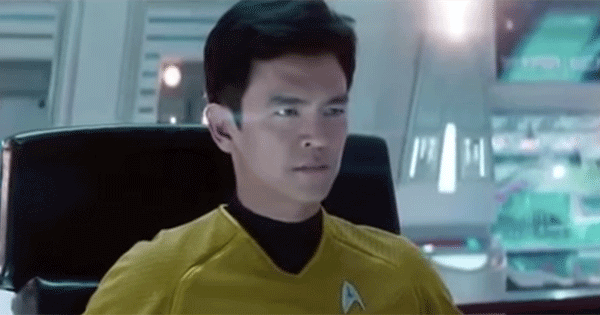Star Trek and the Future of Sex: Gay Characters and LGBT Love
Sexual orientation in Gene Roddenberry’s vision of the future.

“These are the voyages,” The Starship Enterprise, “Make it so,” the logical Vulcans, “Your mind to my mind,” the warlike but noble Klingons, “Hailing frequencies open,” The United Federation of Planets, “I’m a doctor not a—” it’s impossible to say how much of a cultural impact Star Trek, in all of its franchises and incarnations, has had on the world.
A large part of it, of course, was due to the talented writers, actors, producers, and others who helped bring it to life. But much of the credit will always go to the original show’s creator, Gene Roddenberry, (aka “The Great Bird Of The Galaxy”) who saw Star Trek as more than just a science-fiction adventure show.
Roddenberry, in his work and life, always had a very progressive and positive outlook toward the future. For him, Star Trek was a venue for looking at challenges of the 21st century and showing that, with intelligence hard work, and enlightened attitudes, humanity can understand and eventually overcome our differences.
This is particularly true in regards to human sexuality. While the various networks balked at more direct depictions, Roddenberry, and those who carried the torch of Star Trek beyond him, always managed to address some serious social issues—and show that in the future of Star Trek we will have learned to look at sexuality with wisdom and sensitivity.
So, in celebration of Star Trek’s progressive vision of a sexually enlightened humanity, here is a three-part look at special episodes from pretty much each incarnation of the franchise to show the daring that Roddenberry and others took in addressing many important sexual issues of the day by going where, at the time, no one had gone before.
First up is Star Trek and sexual orientation—and our favorite Enterprise helmsman: Hikaru Sulu
Oh my…
It’s public knowledge that one of the things that Roddenberry and others had always wanted to depict in Star Trek, but was blocked by the networks, was the inclusion of specifically gay characters.
The imminent release of Star Trek Beyond has raised this issue yet again when it was announced that Sulu, played by John Cho, would have a coming out moment.
The news of this caused George Takei, who had played Sulu since the original series back in 1966 and through many other shows and movies, to comment that the idea was inappropriate. This was shocking to some, who thought that Takei, a respected gay activist, would applaud the idea of Sulu’s sexuality appearing in the new film.
Talking to the Hollywood Reporter, Takei said: “I’m delighted that there’s a gay character. Unfortunately, it’s a twisting of Gene’s creation, to which he put in so much thought. I think it’s really unfortunate.”
Takei points out that in the future envisioned by Roddenberry being gay would be as common and accepted as every other sexual orientation: there would never be a reason for any character to come out—as nonjudgmental acceptance of sexuality would be universal—and that Sulu has been pretty much accepted as straight. It would, Takei, be much truer to Roddenberry to create a new character that was already gay.
While it may appear that the new film might be wandering away from Roddenberry’s vision, and the show has been limited by what the network would allow, that hasn’t stopped the franchise from artfully dealing with some pretty serious sexual issues in ways that were poignant as well as entertaining.
“What makes you think you can dictate how people love each other?”
A powerful statement of the importance of personal choice when it comes to sexuality comes in the Star Trek: The Next Generation episode “The Outcast.”
Written by Jeri Taylor and Directed by Robert Scheerer, the episode introduces us to the J’naii, an alien race claiming to have no specific gender. However, William Riker (Jonathan Frakes), after spending time with a J’naii named Soren, discovers that not only are certain members of the species born with a gender but that Soren is identified as female—and has fallen in love with Riker.
And Riker has fallen in love with her. The J’nai, though, have a “solution” to those they feel are abhorrent in choosing a gender: psychotectic therapy that basically erases the subject’s preferred sexuality.
Discovered as being female, Soren stands defiant at her trial and speaks what is completely a totally a clear condemnation of sexual bigotry:
[box type=”shadow”][quote]
I am female. I was born that way. I have had those feelings… those longings… all my life. It is not unnatural. I am not sick because I feel this way. I do not need to be helped, and I do not need to be cured. What I do need—what all of those like me need—is your understanding and your compassion. We do not injure you in any way. And yet we are scorned and attacked. And all because we are different. What we do is no different from what you do. We talk and laugh… we complain about work and we wonder about growing old… we talk about our families, and we worry about the future…We cry with each other when things seem hopeless. All the loving things that you do with each other… that’s what we do. And for that, we are called misfits, and deviants… and criminals. What right do you have to punish us? What right do you have to change us? What makes you think you can dictate how people love each other?[/quote][/box]
Tragically, even though he risks his career in Starfleet to save Soren, Riker arrives to too late: arriving just in time to be greeted by a “genderless” and cold Soren.
“In the end, all that matters is how we feel… and what we do about it.”
The issue of the right to love appears again in Star Trek: Deep Space Nine’s episode “Rejoined,” written by René Echevarria and Ronald D. Moore and directed by Avery Brooks.
Featuring the Trill species, a percentage of which can merge with a symbiot and thus create a new personality that is a combination of the two, the story flies straight into the issue of cultural taboos versus personal sexual choice.
In the episode, Jadzia Dax (Terry Farrell), a Trill, encounters another of her species, Lenara Kahn (Susanna Thompson), with whom Dax’s symbiot, in another body, been involved.
In Trill society, there is a huge social prohibition against “Reassociation”: continuing a sexual relationship between previous hosts. Dax, however, clearly has feelings for Lenara—so much so that she is willing to leave Trill society just to be with her.
She explains both her love for Lenara and her frustration with other Trills trying to keep them from “straying” into Reassociation: “Everyone’s trying to… look out for us. Protect us from ourselves. But in the end, all that matters is how we feel… and what we do about it. Because either way, we’re the ones who have to live with the consequences.”
“Rejoined” is clear and beautiful in its message: that people should be allowed to enter into sexual and romantic relationships without pressure to conform—especially against pointless taboos.
Dax might be willing to give everything up for the woman she loves but Lenara, sadly, does not—leaving Dax behind and brokenhearted.
Our next episodes
Coming up in part two, “Star Trek and the Future of Sex: Birth Control and Alien Pregnancy,” we’ll look at how Star Trek examined the extremely relevant issue of birth control in celebrated episodes from Star Trek: The Original Series and Star Trek: Enterprise.
Read part two: “Star Trek and the Future of Sex: Birth Control and Alien Pregnancy”
Read part three: “Star Trek and the Future of Sex: Stigma and the AIDS Epidemic”
Image source: Clevver Movies
Leave a reply
You must be logged in to post a comment.

















